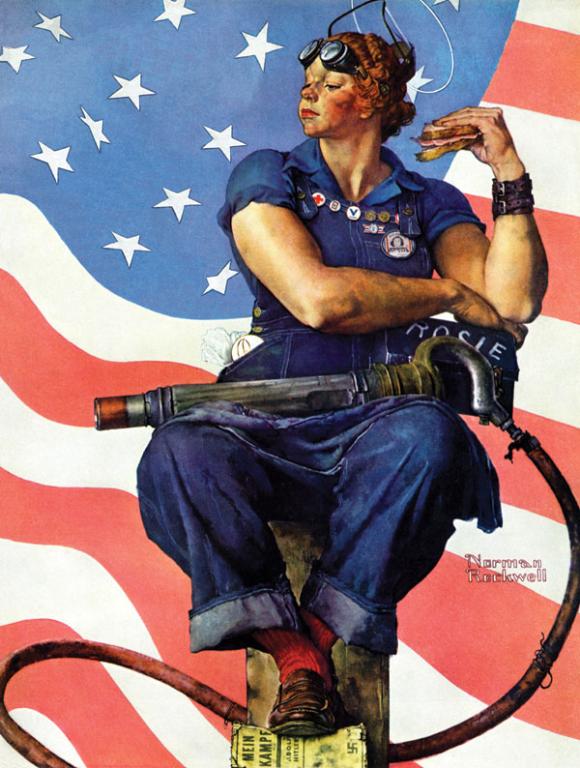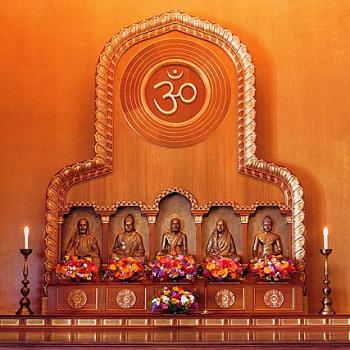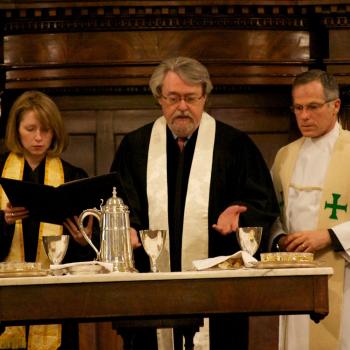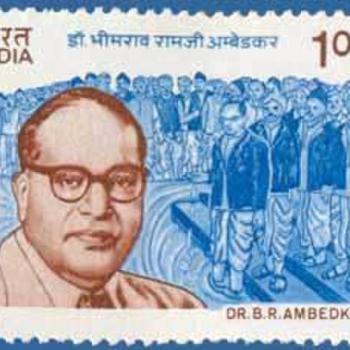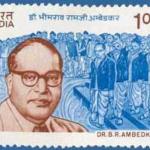As it happens it was seventy-four years ago on this day, the 29th of May, in 1943, that Norman Rockwell’s Rosie the Riveter graced the cover of the Saturday Evening Post. A bunch of years later it would inspire this sermon…
A MEDITATION ON ROSIE THE RIVETER
The Divine Feminine and Liberal Religion and a Vision for a New World
8 November 2009
James Ishmael Ford
First Unitarian Church
Providence, Rhode Island
Text
The spirit of God has sent me to bring good news to the oppressed, to bind up the brokenhearted, to proclaim liberty to the captives and release to the prisoners, to comfort all who mourn, to give them a garland instead of ashes, the oil of gladness instead of mourning, the mantle of praise instead of a faint spirit. They shall build up the ancient ruins, they shall raise up the former devastations of many generations. You shall be called the ministers of our God.
Adapted from Isaiah 61
It was sometime during our first couple of years out here in New England. Jan and auntie and I were still just getting the lay of the land, and as we could we explored. Naturally enough pretty quickly preferences began to emerge: Cape Cod is beautiful and haunting. And we found the coastal ruggedness of Maine and those picture postcard villages even more compelling. Okay, the picture postcard villages are everywhere in New England. But when they cling to the coast, my goodness! However, most of all, we loved the mix of culture and countryside we found in the Pioneer Valley and the Berkshires. On our little escapes from our regular routines, we returned to far Western Massachusetts and southern Vermont more often than most other possible destinations. Still do.
Speaking of picture postcard villages, one bright summer day we were driving through Stockbridge, exploring the area around Tanglewood, when we saw a sign announcing the Norman Rockwell Museum. Now, I was raised to think Rockwell wasn’t really an artist, or at least not a great one. I believe for a couple of reasons. His thematic choices mostly of small town Americana together with his use of an often-humorous realism just ran against the grain of mid and late twentieth centuries intellectual aesthetics. More challenging, I think, and perhaps a more authentic critique, was his free use of sentimentality.
However, by the time we found ourselves in Stockbridge, Rockwell had more or less been rehabilitated, at least, again, within the circles Jan and I tend to move. The pure artistry of his work just cannot be challenged. And while Rockwell could be and often was sentimental, he also touched much deeper currents of the human heart. Clearly he understood love as something more than sentiment, and his paintings celebrated human nobility over and over again. So, we saw the sign and there was no hesitation. We drove up to the museum, parked, paid our entrance fee and walked in to gawk at the collection of almost six hundred paintings.
While there can be no doubt Rockwell loved the sweet, and did tumble into sentimentality with regularity, I have to say, when we walked into the room that displayed Rockwell’s series on race, standing in front of his painting “The Problem We All Live With,” I simply wept. Here was what love looks like. In that painting he called us to both our shadows and to our nobility. If someone doesn’t think that’s real art, I don’t know what they think real art is.
As we left and over the years that have gone by since, possibly the picture that most hangs in my imagination is “Rosie the Riveter.” It is a great picture. It’s an icon of the war effort. Quite literally an icon, drawing upon themes used for images of Mary in both the Eastern and Western churches. Not to mention even older goddess images, hard not to find distant echoes of Ishtar, of Inanna, of Athena. Of Kali. This is a perennial. With those muscles, but that delightful upturned nose and wearing makeup, that rivet gun in her lap, and her foot resting on Mein Kampf; thinking of it and his masterful use of classic religious themes just thrills me. As, I said, it was the most powerful image in my mind continuing from that visit.
Then as I was researching for this sermon I learned two things that caught me. The first was that “Rosie the Riveter” doesn’t hang in the Stockbridge museum. My whole memory of that part of our visit was cooked up somewhere in the back of my brain. After years in private hands Rosie now hangs in the Crystal Bridges museum in Bentonville, Arkansas. I must have seen a print of it in the gift shop and simply incorporated this most powerful for me of Rockwell’s paintings into my memory of that visit. That could be a sermon all by itself. And someday, maybe…
But it was something else that fired me up, that called to my heart, and which I want to share with you today. Rosie ranks for me with “The Problem We All Live With,” as the most important of Rockwell’s paintings. While I was doing that research on Rosie, there wasn’t in fact a lot about how much it is derived from iconic representations of Mary or older goddesses, but rather how the painting is exactly based upon one by Michelangelo; his portrayal of the prophet Isaiah on the Sistine Chapel ceiling. Right down to the arc of the arm, although in the original without the ham sandwich. I suggest there is something to stop and reflect on here.
I suggest as we contemplate Rosie, we think not only of how people pulled together in the second world war or the echoes of Mary and other goddesses throughout time, but also there’s something prophetic here. There is a proclamation here, and I absolutely don’t think it over the top to say a divine proclamation. Rosie is a prescient image, a foreshadowing of something amazing that is going on in our times. It is a call to a holy project, something we are caught up in, and to which we need to recall ourselves, and, I believe, recommit ourselves to in a more conscious way. It has to do with the saving of humanity, and the particular shape of that saving today.
Let me hold up something for you. The horror at Fr Hood ended when a police officer confronted Major Hasan, and was shot by him. While seriously wounded the officer returned fire, putting four bullets into his body, dropping him on the spot. As most of us now know the officer is a sergeant with the Fort Hood Police Department. Her name is Kimberly Munley. There is also a story of another woman in the aftermath of the shooting, nineteen year old Private Amber Bahr, who tore off her blouse to use as a tourniquet for a wounded man, then carried him out before it was noticed she herself was bleeding from a wound to her hip. Think of any image of American and European soldiers in Iraq or Afghanistan, there’s almost always a woman in uniform, often with a gun. If you’re over fifty these images involve significant cognitive dissonance.
There is in this a revolution. This cannot be overstated. Women’s place in our culture is different than it was a single generation ago, and with few exceptions substantially different than throughout history. While it is true there has been a slow but steady progression towards genuine equal rights between women and men for generations, things have begun to move with mind spinning rapidity. We have crossed some tipping point, and we need to notice.
For instance, as regards what is being called “traditional marriage,” setting aside what it means in the scriptures, which would horrify most of us should we look, in English common law, which was our law for most of our history, when a woman and a man married, they became a single person, the man. And that’s the way it has been until 1981, that’s 1981, when the Supreme Court finally struck down all state laws designating men as “head and master” with control over the property owned jointly by the couple. This older perspective is unthinkable for most of us, even most of those calling for something they imagine as traditional marriage.
The revolution is at hand! This is what it means to stand on the side of Love. The realm of heaven is at hand! This is about divine love. A new world is at hand! It is all about love. In Afghanistan, in villages where women are kept in bondage and ignorance, they whisper to their daughters the secret message: they are equal to the men, that’s God’s real message, the god that includes the divine in both male and female. We’re all related, and more; within the web, we’re all one. In Saudi Arabia, women gather in secret and talk of driving and voting and how that is their divine right. In America young women demand to be paid the same as men, and they know the day one of their number will be president is not far off. Love will prevail.
The realm of equity, of justice for all is at hand. There are many concrete expressions. And our president is not the only one. But, it’s all fragile. It can all be overturned. The casual assumption of equality between women and men that is held by many of us, at least those of us under forty, is in fact of recent origin, and really is fragile. Much of this depends upon our shifting view of human sexuality. We’ve had to shift our perspective as a people from thinking men are supposed to be dominant, including sexually, and women passive. The great hubbub around homosexuality turns on the same issues. Strict prescriptions about sexual roles have assured the old paradigm. And they’ve been used to subject women and sexual minorities in exactly the same way.
This is why those of us concerned with the firm establishment of women’s rights are almost always equally concerned with the rights of lesbians, and gay men, of bisexuals and the transgendered. It is one thing. I repeat, as passionately as forcefully as I can: it is one thing. Heterosexual women will not be equal until lesbians and gay men, bisexuals and transgendered people are equal. And, of course, heterosexual men will not be equal until all are equal. If one is oppressed, we’re all oppressed. And, and, this extends out, as obvious as the nose on your face. White people cannot be free and equal unless black people are, as well. It is critical to notice how in the history of oppression of people of color, how sexuality has hung over those issues, as well.
What is central to this revolution is simple enough. We need to move from fixed views about ourselves and about each other, including our ideas of sexual relationships to a dynamic sense of inclusion. This is a call to love as a generous spirit, already expressed in many ways. But by no means is the day won. And again the whole matter is so fragile. But the heart of this is simple enough. Within genuine love freedom for one is freedom for all. That’s why it is so important to let openly gay and lesbian citizens serve in our military. And this is why my heart broke when Maine’s voters rejected marriage equality at the beginning of the week. The battle is not yet won.
And, I think of this loving community, dedicated to a deep spiritual equality grounded within the twin knowledge that each individual is precious and how we are all joined in a great web of relationship, which reveals the dynamic of love. Not sentimental love, but love as a power and a force for transformation. This is a fierce love, a fire burning away the false. I think of what this would look like and I picture Kimberly Munley exchanging fire with a crazed gunman, saving who knows how many lives. And I find myself returning to that amazing icon, Rosie the Riveter. And I think of Isaiah the pattern for Rosie, whose prophetic voice called us back to our best nature, to a path of equity and justice.
And there should be no doubt this is a prophetic call to be transformed by love. So, of course that means there’s a hard part. It isn’t about how they, someone else acts so much as how we, you and I, respond to the call. And the call of mercy and justice, of our deepest possibility brings questions for each of us, for you, and for me.
How deeply have you looked into your heart about these things? Really? And when you have looked, looked deeply, what discomfort do you feel about gay people, whether you’re straight or gay yourself? How do you really feel about people of color, whatever the color of your skin? Where do you think women belong in this life, should a woman have a gun and use it? What tasks do you think women should not do? And why? Then stretch it out, follow the thread. What are your assumptions about people and how they are supposed to relate to each other? And, please, don’t settle for easy answers. Not what you would like to be. But rather, look at yourself naked and full, as you really are.
In the secret place of your heart, can you look honestly and think about it? Can you see something you’re uncomfortable with? Can you admit it, not to anyone else, just to yourself? If you can, that would be enough; self-honesty opens the way. It is the universal solvent. Then you can think of Rosie. Think of her muscles and that dab of makeup. Think of her foot on the bible of evil. There we find an archetype for all of us, an icon of a world that can be.
Here’s some good news. If you can find this openness, love’s heaven is at hand. At that moment when your heart opens, justice will fall like waters, and righteousness like an ever-flowing stream. Everything we do from that place of openness will be graceful. Our lives will become a glorious and sacred dance, now leading, now following, each step a glory for the world.
Come, come whoever you are; join the dance of love and respect, join our dancing revolution into a new world.
Amen.


